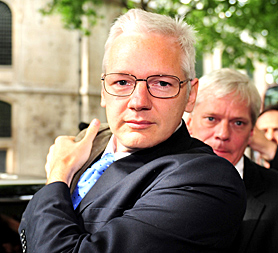WikiLeaks founder Assange fights extradition
WikiLeaks founder Julian Assange returns to court to ask judges again to block his “legally flawed” extradition to Sweden over sexual assault allegations.

Beginning a two-day hearing at the High Court, Julian Assange‘s lawyers challenged a ruling at Belmarsh Magistrates’ Court that his extradition should go ahead.
Ben Emmerson, his defence lawyer, told two judges the European arrest warrant (EAW) on which he was being held was flawed because it failed to provide “a fair, accurate and proper” description of his alleged sexual misconduct in Sweden.
The former computer hacker turned WikiLeaks editor is at the centre of sex allegations which emerged last year as the 40-year-old’s whistleblowing website released tens of thousands of secret war documents relating to the war in Afghanistan.
These were followed with further logs from Iraq and a mass leak of diplomatic cables to and from the US in the autumn.
Mr Assange says the allegations against him are politically motivated, particularly after cable leaks that rocked the US government.
His defence lawyer also argued that Mr Assange was a victim of a “philosophical and judicial mismatch” between English and Swedish law on what constituted sex crimes.
He stressed that the court was not inquiring into the credibility of the women – referred to as SW and AA – who had made complaints against Assange, or determining questions of guilt or innocence.
Nothing he said should be taken to involve any condemnation of the women. It was not intended to challenge “the genuineness of their feelings of regret about having had consensual sex with Mr Assange or trivialise their experiences”.
Who knows who: Julian Assange, hacking on the electronic frontier
Nor was he challenging the fact that they “found Mr Assange’s sexual behaviour in these encounters disreputable, discourteous, disturbing or even pushing towards the boundaries of what they were comfortable with”.
But the sexual activities that occurred had taken place with consent and, unlike in Sweden, could not be criminalised in the English jurisdiction, argued Mr Emmerson.
He said the High Court had to decide whether the “acts” would have been offences had they happened in England.
Mr Assange, wearing a dark-blue suit, sat quietly in court, swapping notes with his defence team and aides.
The Wikileaks founder, who won bail in December, has been staying at Ellingham Hall, the Norfolk farmhouse owned by Vaughan Smith, director of the Frontline media club, which was the venue for his recent 40th birthday party.
His bail conditions include having to wear an electronic ankle tag and check in daily at a nearby police station.
Channel 4 News special report - Secret war files: Afghanistan to Iraq




